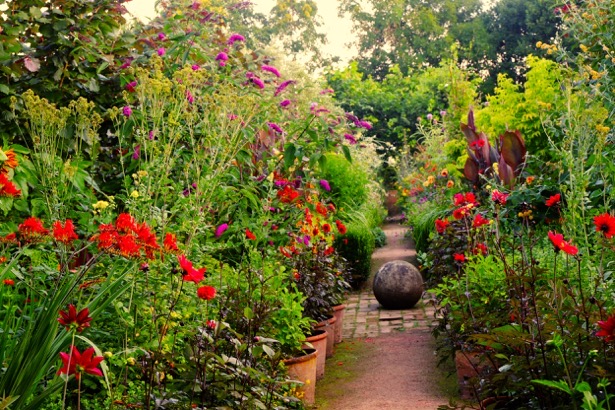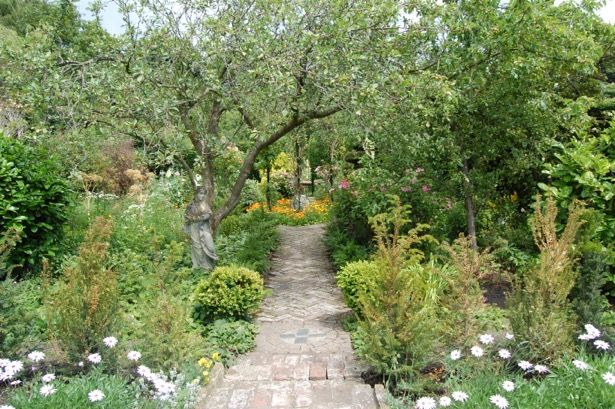The Garlands of Repose

Last week I found myself … well, obsessed might be slightly too strong a word — but let’s say compelled by this three-minute video of English gardening celebrity Monty Don and his dogs walking out in the morning to feed the chickens. Monty’s gentle voice-over just adds to the Zen of the thing. I’ve watched it about ten times. A small glimpse into what certainly looks life a well-ordered life, and one ready to stand up to the complications of our times.
I mentioned in an earlier newsletter that my favorite passage in all of the Bible is the Emmaus Road story from the end of Luke’s Gospel; but close behind it is this passage from the end of John’s:
But Mary [Magdalene] stood weeping outside the tomb, and as she wept she stooped to look into the tomb. And she saw two angels in white, sitting where the body of Jesus had lain, one at the head and one at the feet. They said to her, “Woman, why are you weeping?” She said to them, “They have taken away my Lord, and I do not know where they have laid him.” Having said this, she turned around and saw Jesus standing, but she did not know that it was Jesus. Jesus said to her, “Woman, why are you weeping? Whom are you seeking?” Supposing him to be the gardener, she said to him, “Sir, if you have carried him away, tell me where you have laid him, and I will take him away.” Jesus said to her, “Mary.” She turned and said to him in Aramaic, “Rabboni!”
Whatever you may think about the truth or falsehood of the Christian story, everything about this little narrative is as vivid as sunlight: the weeping woman peering into the tomb; her devastated lament that “They have taken away my Lord, and I do not know where they have laid him”; but above all, for me, the moment at which there is always and inexplicably a catch in my throat, this line: “Supposing him to be the gardener.”
A laborer; a man who works with his hands; a man who tends to living things and brings them health so they can flourish. My Comment colleague Brian Dijkema said to me the other day on Twitter that in the New Creation he’d like to be an apprentice to a gardener. I replied that “The Gardener’s Apprentice” would be a great title for a book about the Christian life.
And now, with all that said, please go read one of the loveliest of all short stories, Rudyard Kipling’s “The Gardener.” If you can come away from it without a tear you’re made of sterner stuff than I am.

A few months ago a great many music writers, and music lovers, were producing “Best Songs of the Decade” list. I didn’t do that, and am not sure what I would put on such a list, but it recently it occurred to me that iTunes can tell me which pop songs from the past decade I have listened to the most. So, in chronological order of release, with “pop” fairly widely defined, and with one song per artist:
- The Flaming Lips, “Revenge” (2010)
- Nujabes, “Spiritual State” (2011)
- The Goat Rodeo Sessions, “Attaboy” (2011)
- Damien Jurado, “Working Titles” (2012)
- Daft Punk, “The Game of Love” (2013)
- Valerie June, “Rain Dance” (2013)
- Spoon, “Inside Out” (2014)
- Yo La Tengo, “Friday I’m in Love” (2015, and that’s the worst video ever, sorry)
- Chris Joss, “Tune Down” (2015)
- Nils Frahm, “A Place” (2018)
Some of those I listen to regularly even now, and some I just went through a brief period of listening to obsessively. Also, I’m not quite as cool as I thought I was. But iTunes don’t lie.
All that duly noted, let me add that my Song for This Year was released in 2005.
The greatest of all poems about gardens is surely Andrew Marvell’s, with his evocation of that wondrous moment when “all flow’rs and all trees do close / To weave the garlands of repose.” A sample, featuring Marvell’s description of the contemplative powers of a mind touched and calmed by a garden:
Meanwhile the mind, from pleasure less,
Withdraws into its happiness;
The mind, that ocean where each kind
Does straight its own resemblance find,
Yet it creates, transcending these,
Far other worlds, and other seas;
Annihilating all that’s made
To a green thought in a green shade.
(There’s nary a poet present or past who wouldn’t kill to have written those last two lines.) But let’s also hear the thoughts of W. H. Auden, in his poem “Their Lonely Betters”:
As I listened from a beach-chair in the shade
To all the noises that my garden made,
It seemed to me only proper that words
Should be withheld from vegetables and birds.A robin with no Christian name ran through
The Robin-Anthem which was all it knew,
And rustling flowers for some third party waited
To say which pairs, if any, should get mated.Not one of them was capable of lying,
There was not one which knew that it was dying
Or could have with a rhythm or a rhyme
Assumed responsibility for time.Let them leave language to their lonely betters
Who count some days and long for certain letters;
We, too, make noises when we laugh or weep:
Words are for those with promises to keep.
 Crook Hall, Durham, England; photo by my wife Teri
Crook Hall, Durham, England; photo by my wife Teri